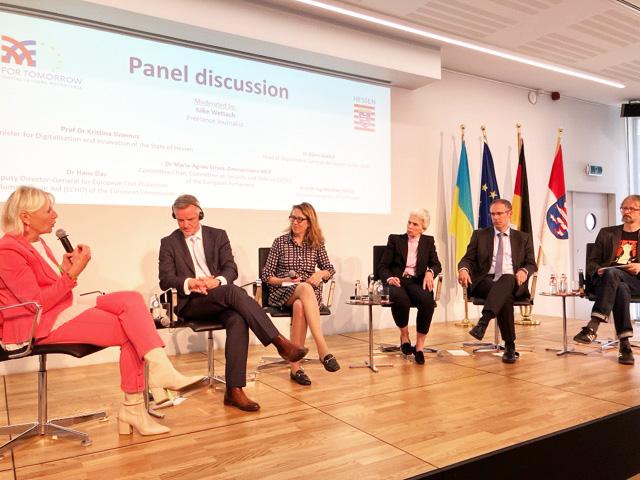Protecting digital infrastructures is essential to remaining capable of action even in crisis situations. A top-class panel discussed how these can be made crisis-proof, sovereign, and future-proof at the Digital Leaders Roundtable at the Representation of the State of Hesse to the EU in Brussels on Wednesday, June 11. Kristina Sinemus, Hessian Minister for Digitalization and Innovation, invited Matthias Hollick, scientific coordinator of the LOEWE Center emergenCITY, Marie-Agnes Strack-Zimmermann, Chair of the Subcommittee on Security and Defence of the European Parliament, Hans Das, Deputy Director-General for European Civil Protection and Humanitarian Aid of the European Commission, and Björn Gütlich, Head of Department at the German Aerospace Center.
“Resilience and sovereignty in the digital space are key prerequisites for the future viability of our economy and society,” Kristina Sinemus emphasized, pointing out the need for a National Center for Digital Resilience in Disasters, which is to be established in Hesse.
“Only on the basis of reliable digital systems can we make sovereign decisions about our technologies – be it in healthcare, administration, or the use of artificial intelligence.” (Kristina Sinemus)
Digital resilience as a priority for crisis preparedness
Hans Das also emphasized the relevance of digital resilience: “The EU is facing an increasing number of threats and risks, many of which are related to or influence the digital space. The functioning of our societies and our individual lives depend on digital infrastructure. Therefore, digital resilience is a priority for crisis preparedness at the national and European levels.”
Digital resilience has long been part of our security architecture, said Marie-Agnes Strack-Zimmermann.
“Anyone who attacks critical infrastructure strikes at the heart of our society – whether in a disaster or in a hybrid war.” (Marie-Agnes Strack-Zimmermann)
That’s why Europe needs robust digital systems, clear responsibilities, and close cooperation between civilian and military actors, said the Chair of the Subcommittee on Security and Defence in the European Parliament.
Basic research still needed
Matthias Hollick pointed out that we as a society generally need to become more digital, but at the same time more resilient, especially in the face of increasingly complex crises and disasters.
“To achieve this, we must continue to conduct fundamental research, continuously apply our research, and involve society from the outset. The planned National Center for Digital Resilience in Darmstadt will ensure this in the long term.” (Matthias Hollick)
Björn Gütlich from the DLR explained how space technology can increase resilience: “With IRIS², the European Commission is preparing a satellite-based communications network that can step in when conventional infrastructure fails – for example, to support emergency services.”
Strengthening Digital Sovereignty – Choosing an All-Society Approach
The discussion highlighted that solutions for digital resilience can only be successfully established through the involvement of all stakeholders (an all-society approach). At the same time, digital sovereignty was a focus: Matthias Hollick emphasized that digital sovereignty in Germany and the European Union is also an important part for the implementation of resilient digital systems. The roundtable participants agreed on this topic as well: If we strengthen digital sovereignty in Europe, thus making ourselves independent of large technology corporations or states, we will also increase security in Europe.
Press release from Hessian Minister for Digitalization and Innovation (German)
News article on the Center for Digital Resilience



